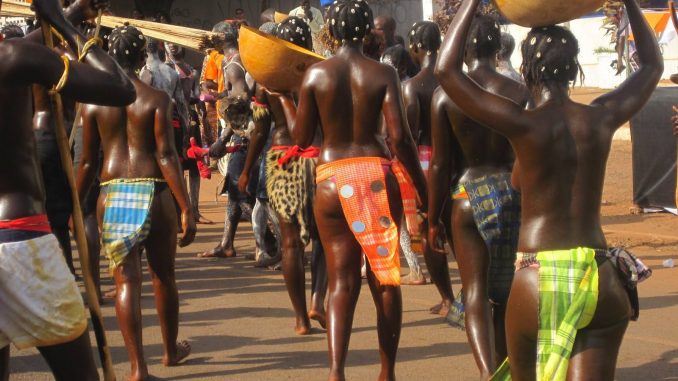
After this rites, the young women are free to engage in any courtship and marry, Bijago people practice the most rigid form of matriarchal system in Africa. On this land it is up to the man to dress handsome to attract a woman and men are to work and look after their wives and women, and inheritance system, of course, is matrilineal.
On the island of Orango Grande, in the Bijagos Archipelago, off the coast of Guinea Bissau, there is a matriarchal society where women possess all the power, where they organise themselves into associations which manage the economy, social welfare and the law. It is they who impose sanctions, direct, advise and distribute goods, and they are respected as the absolute owners of both the house and the land. Here it is the man who has the obligation to dress very well to attract the attention of a woman. Women hold the supreme power of divorce in marriage. Men are turned to only for the tilling of the fields, hunting monkeys and fishing.
Bijago also known as Bissagos,Bojagos,Anaki, Bidjogo, Bidyogo, and Bujagos are an ethnic group which can be encountered only in Guinea Bissau.The Bijagos islands, is the only deltaic archipelago on the Atlantic coast of Africa and it comprises 80 islands and covers an area of nearly 10,000 km off the coast of Guinea Bissau.It is argued that the country`s name “Bissau ” came from the corruption of the name “Bissagos.” It is a patchwork of mudflats, mangroves, palm groves and savanna grasslands which produce a wide diversity and abundance of natural resources. The archipelago currently has a population of some 25,000 inhabitants constituting over 2% of the total population of the country.
Bijago have traditionally resented all centralized authority,whether Portuguese,*French*, English, German or contemporary government officials. In 1447,when the Portuguese explorer, Nuna Tristao, tried to conquer the Bijagos, they killed him instantly because they do not want any form of rule except their matriarchal traditional system that create chiefs to rule them. The Bijagos rose up in rebellion against the Portuguese in 1900,1913-1915,1917,1918,1924 and 1936. Portugal did not consider the Bijago as pacified until 1936.
The Bijago are known from early chroniclers’ accounts for their daring raids on ships along the African coast using huge canoes known as Bijago pirate canoes. They raided on European ships and made away with their cargos and other items on board.
BY: Kweku Darko Ankrah

Wow!what a wonderful culture, I am proud to an african
Great narration. This is Africa
This is who we are!